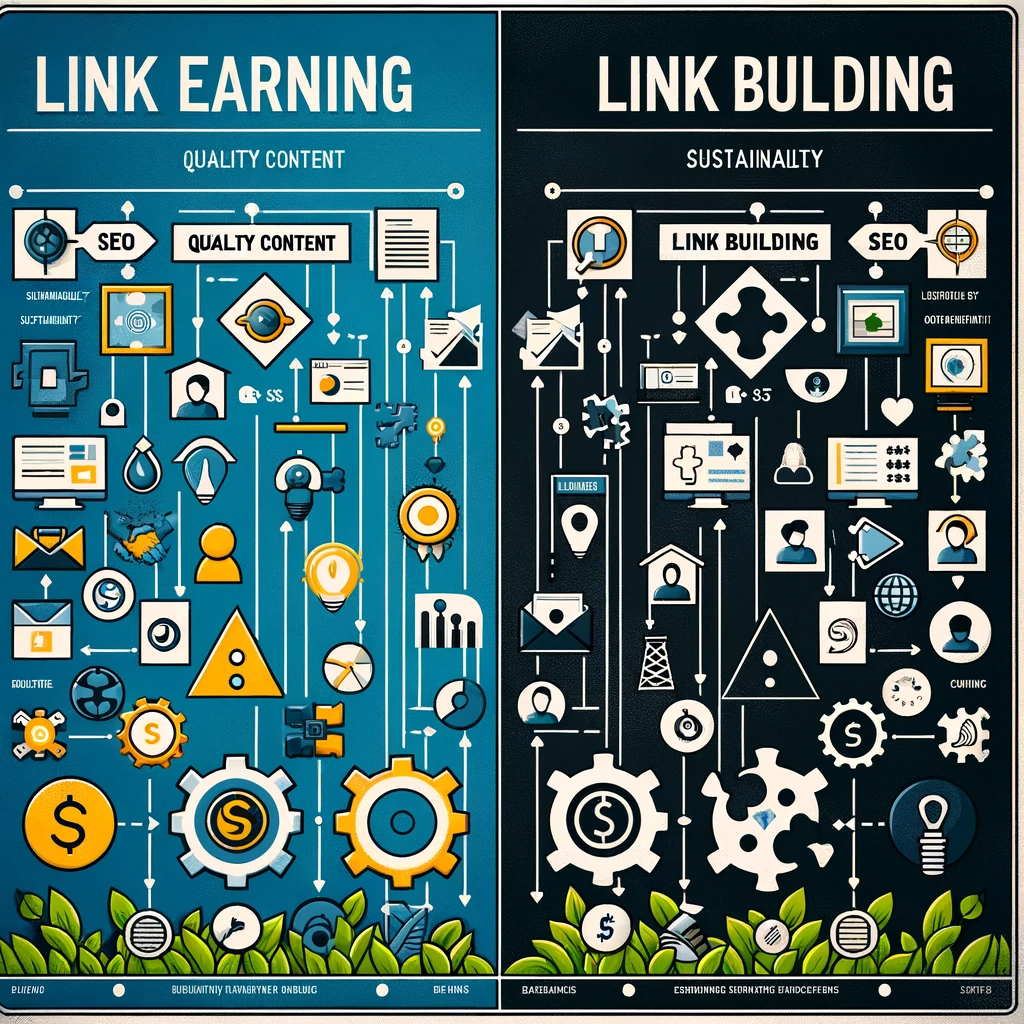Welcome to the world of SEO, where staying ahead of the curve is essential for achieving enhanced web authority. In today’s digital landscape, two common strategies that are often discussed are link earning and link building. To harness the power of modern SEO strategies, it is crucial to understand the key differences between these strategies that play a crucial role in enhancing web authority and improving organic search rankings.
Link earning and link building are two distinct methodologies employed to acquire backlinks, pivotal for improving organic search rankings. Understanding the distinctions between link earning and link building is of utmost importance to develop a comprehensive SEO strategy. By comprehending these differences, you can make informed decisions, identify the most suitable approach for your website, and achieve long-term success in your SEO efforts.
In this comprehensive guide, we will explore the ins and outs of link earning vs. link building, ensuring you have all the knowledge necessary to master modern SEO strategies and boost your web authority. From understanding the differences to implementing effective strategies and transitioning to link earning, we will cover it all.
What is Link Earning?
In the realm of SEO, link earning refers to the process of acquiring backlinks for a website through the creation and promotion of high-quality content and the development of compelling website features. Unlike traditional link building, which involves actively pursuing and acquiring links from targeted websites to boost your website’s visibility and authority, link earning takes a more passive approach, relying on the organic and natural acquisition of links.
Link earning is rooted in the concept of producing exceptional content that offers value to the target audience. By creating informative articles, engaging videos, visually appealing infographics, and other forms of valuable content, website owners can attract links from other websites that find the content useful and relevant.
Additionally, link earning also involves developing website features that enhance the overall user experience. This can include intuitive navigation, fast page loading times, mobile-friendly design, and interactive elements. By providing a positive user experience, websites are more likely to earn links from other websites organically.
One of the key characteristics of link earning is its passive nature. Rather than actively pursuing links, link earning focuses on creating content and website features that naturally attract links. This approach ensures that the acquired links have a higher quality and are more likely to contribute positively to the website’s authority and SEO ranking.

What is Link Building?
In the world of SEO, link building plays a crucial role in improving website authority and search engine rankings. It involves the active pursuit of building links from targeted websites to your own. Let’s explore the definition of link building, the methods it employs, and the marketing strategies that contribute to its success.
Definition and Methods of Link Building
Link building is the process of acquiring hyperlinks from external websites to your own site. These hyperlinks, also known as backlinks, serve as votes of confidence for your website’s credibility and relevance. There are various methods employed in link building, including:
- Outreach: Proactively reaching out to webmasters and bloggers in your industry to request a link to your content.
- Guest Posting: Writing high-quality guest posts for reputable websites in your niche, with a link back to your site in the author bio or content itself.
- Collaborations: Partnering with influencers, industry experts, or complementary brands to create mutually beneficial content that includes backlinks.
Active Pursuit of Links
Unlike link earning, which relies on the passive acquisition of natural links through high-quality content, link building involves actively seeking and acquiring links. This proactive approach requires a well-thought-out strategy to identify relevant websites, establish relationships with webmasters, and secure valuable backlinks. By actively pursuing links, you can drive targeted traffic to your site and boost your website’s authority in the eyes of search engines.
Marketing Strategies in Link Building
Effective link building requires the integration of marketing strategies to maximize its impact. Some key marketing strategies in link building include:
- Content Marketing: Creating compelling, informative, and shareable content that naturally attracts backlinks.
- Social Media Promotion: Sharing your content on social media platforms to increase its visibility and encourage link sharing.
- Influencer Marketing: Collaborating with influencers or industry experts who can promote your content and provide valuable backlinks.
- Public Relations: Utilizing press releases and media coverage to generate interest in your brand and gain authoritative backlinks.
Incorporating these marketing strategies into your link building efforts can help you effectively promote your content, build relationships, and acquire high-quality backlinks that contribute to your website’s SEO success.
Key Differences Between Link Earning and Link Building
In the world of SEO, there are two prominent strategies for acquiring valuable backlinks: link earning and link building. While both approaches aim to enhance website authority and improve search engine rankings, they differ significantly in terms of approach, sustainability, and SEO impact.

Approach Comparison
Link earning focuses on creating high-quality content and developing website features that naturally attract backlinks. It emphasizes the production of valuable and engaging resources that users find useful and worthy of sharing. In contrast, link building involves actively pursuing and acquiring links from targeted websites through outreach, collaborations, and other marketing strategies.
By adopting a link earning approach, businesses can establish a strong online presence based on the merits of their content and website. This organic approach aligns with search engine algorithms’ emphasis on rewarding quality, relevance, and user satisfaction.
Sustainability Comparison
One key distinction between link earning and link building lies in their long-term sustainability. Link earning, with its focus on producing valuable content and positive user experiences, establishes a foundation for sustained organic growth. Natural backlinks earned through link earning are more likely to be sustainable and have a lasting impact on website authority.
On the other hand, link building strategies can often be short-term and reliant on the efforts of outreach and collaboration. While link building can yield immediate results, there is a higher risk of penalties from search engines if the strategies employed are deemed manipulative or spammy.
SEO Impact Comparison
The approach chosen, whether link earning or link building, can significantly impact the SEO performance of a website. Link earning, with its emphasis on creating valuable content, contributes to improved user experience and increased website traffic. The natural backlinks earned through link earning serve as strong endorsements and signals to search engines, leading to higher search engine rankings.
On the other hand, link building can still provide short-term SEO benefits by acquiring relevant backlinks from authoritative websites. However, search engine algorithms are becoming increasingly sophisticated in identifying and discounting manipulative link building tactics. This makes the long-term SEO impact of link building strategies less reliable.

The Shift Towards Passive Link Earning
In recent years, the SEO industry has witnessed a shift away from active link building towards a more passive link earning approach. This change is motivated by search engines’ evolving algorithms, which prioritize the quality and relevance of content and user experiences.
Businesses are now recognizing the value of investing in content creation, developing exceptional resources, and cultivating positive user experiences to attract natural backlinks. This shift allows for a more sustainable and ethical approach to SEO, aligning with search engines’ objectives of delivering valuable and relevant results to users.
Table: A Comparison Between Link Earning and Link Building
| Aspect | Link Earning | Link Building |
|---|---|---|
| Approach | Focus on high-quality content and website features | Actively pursue links through marketing strategies |
| Sustainability | Establishes a foundation for sustained organic growth | Can be short-term and reliant on outreach efforts |
| SEO Impact | Improved user experience, increased website traffic | Can provide immediate SEO benefits but less reliable in the long term |
The Value of Link Earning
In the world of SEO, link earning plays a crucial role in establishing a strong online presence and enhancing website authority. By focusing on link earning rather than link building, businesses can reap numerous benefits that contribute to their long-term SEO sustainability.
High-Quality Links and Improved Website Authority
One of the key advantages of link earning is the acquisition of high-quality links. Unlike link building, which often involves quantity over quality, link earning focuses on earning links from authoritative websites that are relevant to your industry or niche. These high-quality links not only improve your website’s authority in the eyes of search engines but also attract targeted traffic from authoritative sources.
Avoidance of Penalties and Enhanced Brand Awareness
By earning links naturally through valuable content and positive user experiences, businesses can avoid the risk of penalties from search engines. Search engines increasingly value organic and natural links, and link earning aligns with their guidelines, mitigating the risk of penalties that can negatively impact your SEO efforts.
In addition, link earning also contributes to enhanced brand awareness. When your content is linked to and shared by authoritative websites, it exposes your brand to a wider audience, expanding your reach and visibility in the online space. This increased brand awareness can result in higher brand credibility and recognition among potential customers.
Contribution to Long-Term SEO Sustainability
Perhaps the most significant advantage of link earning is its contribution to long-term SEO sustainability. Unlike link building, which often requires continuous effort to maintain and acquire new links, link earning focuses on creating valuable and engaging content that naturally attracts links over time.
By investing in link earning strategies, businesses can establish a strong foundation of high-quality links and authoritative website connections. This foundation provides a sustainable framework for long-term SEO success, helping to improve organic rankings, drive targeted traffic, and increase conversions.
In conclusion, the value of link earning in modern SEO strategies cannot be overstated. Through the acquisition of high-quality links, businesses can establish improved website authority, avoid penalties, enhance brand awareness, and maintain long-term SEO sustainability. By prioritizing link earning over traditional link building tactics, businesses can set themselves up for long-term success in the increasingly competitive online landscape.
Strategies for Link Earning
In order to effectively earn links for your website, it is important to implement various strategies that will help you attract natural and high-quality backlinks. Here are some key strategies that can contribute to your link earning efforts:
1. Creating exceptional, engaging content
One of the most effective ways to earn links is by creating exceptional and engaging content that provides value to your audience. When you produce high-quality content that is unique, informative, and engaging, it becomes shareable and naturally attracts links from other websites and bloggers. Focus on producing content that is well-researched, relevant to your target audience, and offers solutions or insights that cannot be found elsewhere.

2. Building relationships with influencers and industry experts
Another valuable strategy for link earning is to build relationships with influencers and industry experts in your niche. By establishing genuine connections with influential individuals, you can increase the likelihood of them promoting and linking to your content. This can be achieved through engaging with them on social media, participating in industry events, or collaborating on content projects. When influencers and industry experts endorse your content, it not only brings in valuable links but also enhances your credibility and visibility within your industry.
3. Utilizing social media, press releases, and original ideas
Social media platforms can play a crucial role in link earning strategies. By actively engaging with your target audience on social media, sharing your content, and participating in relevant discussions, you can increase the visibility and reach of your content. Additionally, utilizing press releases can help you generate buzz and gain attention from relevant media outlets, resulting in valuable backlinks. Furthermore, emphasizing original ideas and offering unique perspectives in your content can make it stand out and increase its chances of attracting links.
Tips for effective link earning
Here are some tips to maximize the effectiveness of your link earning strategies:
- Focus on creating valuable and shareable content that naturally earns links.
- Research and identify influencers and industry experts who are likely to appreciate your content and promote it.
- Engage with influencers and industry experts through thoughtful and meaningful interactions.
- Utilize social media platforms to share and promote your content, engaging with your audience and encouraging them to share it as well.
- Write compelling press releases that attract attention and interest from relevant media outlets.
- Stay updated with the latest trends and topics in your industry to provide fresh and original ideas in your content.
- Monitor and analyze your link earning efforts to identify what strategies are working and adjust your approach accordingly.
By implementing these strategies and following these tips, you can significantly enhance your link earning efforts and improve your website’s visibility, authority, and rankings in search engine results.
| Table: Strategies for Effective Link Earning |
|---|
| 1. Create exceptional and engaging content |
| 2. Build relationships with influencers and industry experts |
| 3. Utilize social media, press releases, and original ideas |
| 4. Implement tips for effective link earning |
| 5. Stay updated and adapt your strategies |
The Role of Content in Link Earning
The role of content is pivotal in link earning, playing a crucial role in attracting natural links and establishing authority in the industry. Producing high-quality, original, and relevant content is essential to achieve link earning success. Quality content not only captivates the target audience but also increases the chances of earning valuable links from reputable sources.
Importance of Quality, Originality, and Relevance
Quality content is the backbone of link earning. It not only engages and informs the audience but also increases the credibility and trustworthiness of a website. High-quality content that provides valuable insights, unique perspectives, and useful information is more likely to attract organic links from other websites.
Originality is equally important in link earning. Creating content that stands out from the competition and offers fresh ideas or perspectives allows websites to establish themselves as thought leaders in their respective industries. When websites publish original content, they become more attractive to other content creators and are more likely to earn valuable links.
Relevance is another key factor in link earning. Content that aligns with the interests and needs of the target audience is more likely to be shared, linked to, and referenced by other websites. Producing content that addresses current trends, solves common problems, or provides valuable insights solidifies the website’s position as a reliable source and increases the chances of earning relevant links.
Types of Content That Perform Well for Link Earning
While there are various types of content that can contribute to link earning, several formats have proven to be particularly effective:
- Informative articles: In-depth articles that offer valuable information, insights, and analysis are highly shareable and link-worthy.
- Infographics: Visual representations of data or complex concepts are engaging and often get shared on other websites.
- Videos: Engaging and informative videos that offer unique perspectives or address specific topics have the potential to go viral and attract links.
These are just a few examples of the types of content that can perform well for link earning. The specific content formats will depend on the target audience, industry, and goals of the website.
The Power of Storytelling and Thought Leadership
The power of storytelling cannot be underestimated in link earning. Creating compelling narratives and stories that resonate with the audience can evoke emotions, engage readers, and encourage them to share the content with others. When websites effectively incorporate storytelling into their content, they create a unique connection with their audience, making them more likely to earn valuable links.
Similarly, establishing thought leadership is a powerful way to attract links. When websites consistently produce content that showcases expertise, unique insights, and industry knowledge, they become go-to sources for other content creators. Websites that position themselves as thought leaders are more likely to earn links from authoritative sources seeking reliable and trustworthy information.
Transitioning from Link Building to Link Earning
In the ever-evolving landscape of SEO, transitioning from traditional link building strategies to a more sustainable link earning approach has become crucial for long-term success. By adapting strategies that emphasize content creation and utilizing SEO tools effectively, website owners can unlock the full potential of link earning and establish a strong online presence.

Adapting Strategies for a More Sustainable Approach
To transition from link building to link earning, it’s essential to reevaluate existing strategies and make sustainable changes. Rather than solely focusing on acquiring links, the emphasis shifts towards creating high-quality content that naturally attracts organic backlinks.
By investing time and effort in producing exceptional, engaging content, website owners can position themselves as industry experts and thought leaders. This approach not only leads to valuable backlinks but also establishes trust, enhances brand reputation, and improves overall web authority.
Emphasizing Content Creation over Traditional Link-Building Tactics
Gone are the days when link building solely relied on manual outreach and guest posting. In the age of link earning, the emphasis is placed on the creation of valuable, informative content that meets the needs and interests of the target audience.
Website owners must prioritize the development of original, relevant, and engaging content that provides value to visitors. Doing so will naturally attract backlinks from authoritative websites and increase the chances of gaining visibility in search engine rankings.
Utilizing SEO Tools and Analytics for Effective Transitions
To facilitate the transition from link building to link earning, it’s essential to leverage the power of SEO tools and analytics. These tools enable website owners to identify relevant keywords, analyze competitor strategies, and understand user behavior.
By utilizing SEO tools, such as keyword research tools and backlink analysis software, website owners can uncover valuable insights that inform their content creation and link earning strategies. These insights help identify opportunities for growth, optimize existing content, and track the success of link earning efforts.

Furthermore, utilizing analytics tools allows website owners to monitor user engagement, track conversions, and make data-driven decisions to improve the overall user experience. This data-driven approach ensures that link earning efforts align with the interests and preferences of the target audience.
| Transitioning from Link Building to Link Earning: Key Strategies |
|---|
| 1. Prioritize content creation and quality |
| 2. Develop valuable website features |
| 3. Leverage SEO tools and analytics |
| 4. Focus on user engagement and experience |
| 5. Build relationships with influencers and industry experts |
Transitioning from link building to link earning requires a strategic and holistic approach. By adapting strategies for sustainability, emphasizing content creation, and utilizing SEO tools effectively, website owners can navigate the ever-changing SEO landscape and achieve long-term success in enhancing their web authority.
Benefits of Link Earning Over Traditional Link Building
In the realm of SEO, link earning offers several advantages over traditional link building strategies. By focusing on link earning, websites can achieve long-term sustainability and reduce the risk of penalties from search engines. Furthermore, link earning leads to a diverse link profile, resulting in higher conversion rates and improved user experience. Ultimately, link earning drives increased website traffic and strengthens the overall online presence of a brand.
The Future of Link Earning in SEO
In the world of SEO, the landscape of link earning is constantly changing. With evolving SEO practices, the importance of organic growth in link earning strategies is increasing. As we look towards the future, it is crucial to anticipate the trends and adapt best practices to stay ahead of the game.
Evolving SEO Practices and the Increasing Importance of Organic Growth
Gone are the days of purely relying on traditional link building tactics. Search engines are placing a greater emphasis on organic growth and high-quality content. This means that link earning strategies must shift towards a more sustainable approach that focuses on creating valuable and engaging content.
By producing exceptional content, businesses can attract natural, high-quality backlinks from relevant websites. This organic growth not only improves website authority but also reduces the risk of penalties from search engines.
The Changing Landscape of Backlinks: Do-Follow vs. No-Follow
The backlink landscape is also undergoing significant changes, with a growing distinction between do-follow and no-follow backlinks. While do-follow backlinks pass on authority and contribute to organic growth, no-follow backlinks still play a role in diversifying a website’s link profile.
It is important to understand the differences between these types of backlinks and adapt link earning strategies accordingly. A well-rounded backlink profile that includes both do-follow and no-follow links can help build credibility and improve search engine rankings.
Anticipated Trends and Best Practices in Link Earning
As the future unfolds, several key trends are expected to shape the field of link earning. These trends include:
- The increasing importance of user experience and website performance metrics in link earning.
- The rise of influencer marketing and collaborations as effective strategies to earn high-quality links.
- The integration of social media platforms and content marketing in link earning campaigns.
- The focus on relevance and context in link earning strategies to align with search engine algorithms.
To adapt to these anticipated trends and ensure successful link earning, it is essential to follow best practices:
- Create valuable and engaging content that resonates with the target audience.
- Build relationships with influencers and industry experts to gain endorsements and natural links.
- Utilize social media platforms to amplify content reach and encourage link sharing.
- Monitor and analyze SEO metrics to identify opportunities for optimization and improvement.
By staying informed about anticipated trends and implementing best practices, businesses can stay ahead in the future of link earning and achieve enhanced web authority through organic growth.
| Key Points | Details |
|---|---|
| Evolving SEO Practices | Shift towards organic growth and high-quality content |
| Changing Backlink Landscape | Distinction between do-follow and no-follow backlinks |
| Anticipated Trends | User experience, influencer marketing, social media integration, relevance |
| Best Practices | Create valuable content, build relationships, utilize social media, analyze SEO metrics |
Conclusion
The world of SEO is constantly evolving, and in the battle between link earning and link building, it is clear that link earning has emerged as the superior strategy for modern SEO success. Throughout this article, we have discussed the key differences between link earning and link building, and the importance of understanding these distinctions.
Link earning, with its passive nature and emphasis on high-quality content and website features, offers a sustainable approach that not only improves web authority but also helps avoid penalties from search engines. By creating exceptional and engaging content, building strong relationships with influencers, and utilizing social media and press releases, you can effectively earn valuable links that contribute to long-term SEO success.
It is crucial for businesses to prioritize link earning over traditional link building tactics. The shift towards a sustainable and quality-focused approach not only ensures higher conversion rates and improved user experiences, but also paves the way for increased website traffic and enhanced brand awareness.
In conclusion, link earning is the future of SEO. By adopting this approach and focusing on quality content, businesses can maximize their web authority, establish themselves as thought leaders, and achieve long-term success in the ever-changing world of search engine optimization.
Link Earning vs. Link Building Related FAQ:
Q: What is the difference between link earning and link building?
A: Link earning refers to the passive acquisition of high-quality links through the production of valuable content that naturally attracts backlinks from authoritative sources and positive user experiences. Link building, on the other hand, involves actively seeking and acquiring links through strategies like outreach and guest posting.
Q: How does link earning work?
A: Link earning works by creating high-quality content and developing website features that naturally attract links from other websites. These links are earned organically through positive user experiences and valuable content.
Q: What are some strategies for link earning?
A: Some strategies for link earning include creating exceptional and engaging content, building relationships with influencers and industry experts, utilizing social media and press releases, and implementing original ideas to attract links.
Q: What role does content play in link earning?
A: Content plays a crucial role in link earning as high-quality, original, and relevant content is more likely to attract links from other websites. Informative articles, infographics, and videos are examples of content that perform well in link earning efforts.
Q: How can I transition from link building to link earning?
A: To transition from link building to link earning, it is important to shift focus from actively pursuing links to creating valuable content and developing website features. This approach emphasizes content creation and utilizing SEO tools and analytics to identify opportunities for effective transitions.
Q: What are the benefits of link earning over traditional link building?
A: Link earning carries the benefits of attracting more relevant authoritative backlinks that offers long-term sustainability, reduces the risk of penalties from search engines, and helps build a diverse link profile. It also leads to higher conversion rates, improved user experience, and increased website traffic. This approach also helps in building a strong domain authority and brand reputation, which contributes to long-term SEO success.
Q: What is the future of link earning in SEO?
A: The future of link earning in SEO aligns with the evolving practices in the industry, emphasizing the importance of organic growth. Understanding the changing landscape of backlinks, including the distinction between do-follow and no-follow links, and adapting to anticipated trends are essential to future link earning strategies.
Q: Why is link earning important in modern SEO strategies?
A: Link earning is important in modern SEO strategies because search engines like Google prioritize high-quality, natural backlinks. By focusing on link earning, websites can increase their authority and visibility in search engine results pages (SERPs) without the risk of being penalized for low-quality or spammy backlinks.
Q: How can I earn high-quality links naturally?
A: To earn high-quality links naturally, you need to create compelling and valuable content that other websites would want to link to. This content should be original, informative, and relevant to your target audience, making it desirable for other websites to link to it.
Q: How does link earning contribute to a website’s SEO strategy?
A: Link earning is a fundamental element of a website’s SEO strategy as it helps in naturally building a strong backlink profile. These high-quality backlinks contribute to improved search engine rankings, organic traffic, and overall online visibility.
Q: Is there a risk of being penalized for link earning?
A: If link earning is done through natural means by creating valuable content that other websites genuinely want to link to, there is no risk of being penalized. However, attempting to manipulate the process by engaging in unethical practices may lead to potential penalties from search engines.
Q: What types of content can attract natural backlinks for link earning?
A: Content that is informative, unique, and valuable to users tends to attract natural backlinks. This includes in-depth guides, original research, industry reports, and engaging multimedia content that can serve as a resource or reference for other websites in your niche.
Q: How can I distinguish between high-quality and low-quality inbound links when earning links?
A: High-quality inbound links come from authoritative, relevant sources and are earned naturally due to the value of your content. In contrast, low-quality inbound links may come from spammy or unrelated sources and can negatively impact your website’s reputation and SEO performance.
Q: Can link building and link earning coexist in a digital marketing strategy?
A: Yes, link building and link earning can complement each other in a comprehensive digital marketing strategy. While link building can help in actively acquiring backlinks from targeted sources, link earning focuses on creating content that organically attracts high-quality links, leading to a well-rounded SEO approach.
Q: How can I disavow bad backlinks that were not earned through link earning?
A: If you have acquired low-quality or spammy backlinks that are harming your website’s SEO, you can use Google’s Disavow Tool to request the search engine to ignore those backlinks. This helps in distancing your website from unfavorable links that were not earned through genuine link earning strategies.



 Alex specializes in integrating comprehensive digital strategies, excelling particularly in SEO, content marketing, and data analytics. His approach involves a unique blend of creative storytelling and meticulous data analysis, ensuring every campaign is both engaging and effective.
Alex specializes in integrating comprehensive digital strategies, excelling particularly in SEO, content marketing, and data analytics. His approach involves a unique blend of creative storytelling and meticulous data analysis, ensuring every campaign is both engaging and effective.